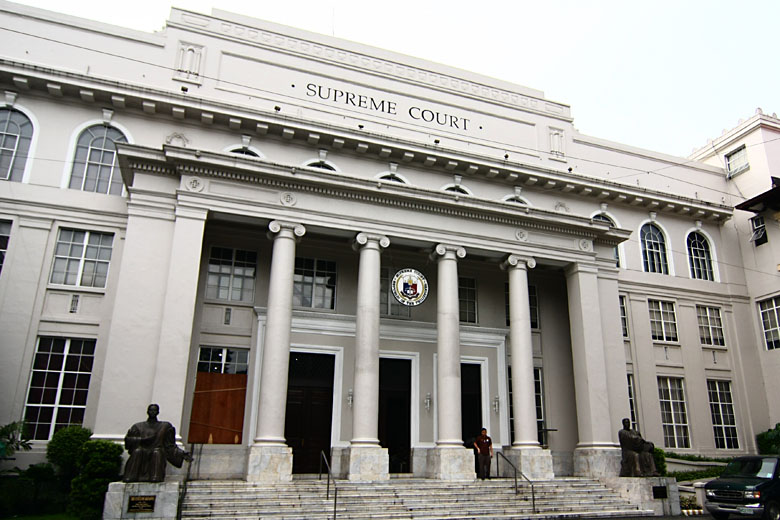
By LALA ORDENES
FEARING that Congress may be either underrepresented or overrepresented in the Judicial and Bar Council (JBC) proceedings, the Supreme Court on Friday modified its July 17 decision limiting Congress to only one representation in the council that vets judicial nominees.
In an Aug. 3 minute resolution, the SC declared it in the best interest of justice to allow both Sen. Francis Escudero and Rep. Niel Tupas Jr. to simultaneously sit in the council as ex officio members of Congress. Escudero and Tupas chair the Committee on Justice in their respective chambers.
Congress would be underrepresented if the court would eventually overturn its July 17 decision saying that only one member from Congress could sit in the JBC. On the other hand, Congress would be overrepresented if the Court eventually affirms its July 17 decision of allowing only one seat for the legislative branch in the council.
Because of these possibilities, the court halted the immediate execution of its July 17 decision until it has resolved whether or not to allow both chambers to send representatives to the JBC. The SC ordered the JBC, Escudero, Tupas and former Solicitor General Francisco Chavez to submit their memoranda within 10 days. In the meantime, both Escudero and Tupas could participate in the JBC deliberations.
Chavez, in his petition to the High Court, had questioned the presence of two members of Congress in the JBC, saying this runs counter to the Constitution which states that the JBC shall be composed of seven members, including one member of Congress.
Last July 17, the court declared the current composition of the JBC with two Congress representatives as unconstitutional and ordered the council to reconstitute itself so that only one representative from Congress could sit in the council’s proceedings.
The High Court’s Aug. 3 resolution said, however, the July 17 decision, though immediately executory, has not become final because of the motion for reconsideration filed by Escudero and Tupas. But the selection process for the Chief Justice has started when the JBC opened the application and recommendation of nominees on July 6.
The High Court said the nonfinality and the immediately executory nature of its July 17 decision barred Congress from sending both Escudero and Tupas from sitting in the panel interviews of the nominees.
Only Tupas sat for Congress in the first three days of the four-day panel interviews last July 24 to 28. Escudero did not attend any of the proceedings.
The final deliberations and voting for the nominees was originally scheduled for Aug. 2.
The bicameral Congress decided to withdraw from the proceedings after the SC, through its spokesperson, said the voting would proceed with or without representatives from the legislature.
Tupas said both chambers of Congress decided not to participate further in the proceedings until the issue was resolved.
The Supreme Court then set oral arguments to finally resolve the case on Aug. 2. Sen. Joker Arroyo argued for the Upper House.
In his argument, Arroyo said despite its two representatives, the legislative branch is underrepresented in the JBC. He pointed out that the President, who has the final say in the appointment, effectively has five representatives in the JBC: the Secretary of Justice as ex officio member, and the four regular members appointed by the executive.
Section 8 of Article VIII of the 1987 Constitution states that the Judicial and Bar Council is composed of the Chief Justice as ex officio chairman, the Secretary of Justice, and a representative of the Congress as ex officio members, a representative of the Integrated Bar, a professor of law, a retired Member of the Supreme Court, and a representative of the private sector.
The July 17 decision came after former Solicitor General Francisco Chavez, who has been nominated to the chief justiceship, filed a petition questioning the practice of having two representatives from Congress in the JBC, despite the Constitutional provision which states that “a representative of Congress” should sit in the council.
Until the Estrada presidency, the two members of Congress who sat in the JBC would take turns attending meetings and taking part in the selection and voting for nominees to be submitted to the President. The setup changed in 2001 when they were given one vote each. This effectively increased the membership of the council to eight and the number of majority votes from four to five.
The chief executive must choose from a list of at least three nominees submitted by the council. The Constitution provides that any vacancy in the Supreme Court must be filled within 90 days from its occurrence.
The highest judicial post in the land was vacated on May 29 when the Senate handed down its guilty verdict in the impeachment case against former Chief Justice Renato C. Corona.